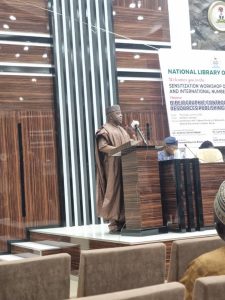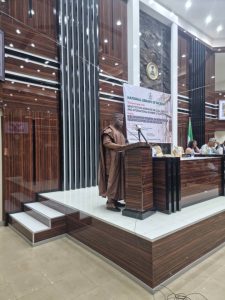![]()
Introduction
The Nigerian publishing industry plays a vital role in promoting literacy, knowledge dissemination, and cultural preservation. To ensure its continued growth and development, it is crucial to establish robust systems of bibliographic control and compliance with relevant laws and regulations.



On the 8th June, 2023, Lanre Adesuyi, the Managing Director & Chief Executive of Havilah Group, delivered a keynote address at the Sensitization Workshop on Legal Deposit Compliance and the Utilization of International Standard Numbers by the National Library of Nigeria. In his speech, Adesuyi emphasized the significance of bibliographic control and its impact on the industry’s efficiency and effectiveness.
The Importance of Bibliographic Control
Bibliographic control refers to the systematic organization and management of published materials, including books, journals, and other resources. It involves cataloging, classification, indexing, and the creation of comprehensive bibliographic databases. When implemented effectively, bibliographic control facilitates access to information, aids in resource discovery, and supports scholarly research.
Adherence to Legal Requirements
Adesuyi highlighted the importance of complying with legal requirements, such as the use of international standard numbers (ISBN, ISSN) and the deposit of published works with the National Library of Nigeria. These regulations, inherited from the colonial era, serve as forward-looking initiatives aimed at building rich archives for the preservation of published materials for future generations.
By complying with legal requirements, publishers contribute to the preservation of Nigeria’s literary heritage, protect intellectual property rights, and ensure that valuable works are accessible to researchers, students, and the general public. Furthermore, these requirements help align Nigerian publishing practices with global standards, fostering international recognition and enhancing the industry’s reputation.
Challenges and Solutions
Adesuyi addressed some of the challenges facing the industry, such as the proliferation of publishing houses focused solely on economic gains, resulting in diminished quality of output. To tackle these challenges, a multi-pronged approach is necessary.
Awareness and Education: The National Library of Nigeria, through its Legal Deposit Department, should intensify efforts to create awareness among publishers, authors, and other stakeholders about the importance of bibliographic control. Workshops, seminars, and educational campaigns should be conducted to ensure a comprehensive understanding of legal requirements and their benefits.
Strengthened Enforcement: Efforts should be made to ensure efficient enforcement of legal deposit regulations. Strict adherence to timeframes for deposits, the required number of copies, and penalties for non-compliance will instill a sense of responsibility among publishers and enhance the effectiveness of bibliographic control.
Collaboration and Industry Standards: Collaboration between publishers, libraries, and other relevant stakeholders is essential. Establishing industry standards, sharing best practices, and promoting ethical conduct will foster a culture of excellence and professionalism within the Nigerian publishing industry.
Review and Adaptation: Regular reviews of existing legal stipulations for legal deposits should be undertaken to ensure their relevance in a rapidly evolving publishing landscape. These reviews should be conducted in consultation with industry experts and take into account emerging trends and technological advancements.
The Way Forward
Bibliographic control serves as the foundation for effective resource discovery and knowledge dissemination. By embracing and strengthening bibliographic control practices, the Nigerian publishing industry can enhance its reputation, attract international collaborations, and contribute to the preservation and promotion of the country’s rich literary heritage.
It is imperative that all stakeholders within the industry, including publishers, authors, librarians, and regulatory bodies, work together to create a supportive ecosystem that fosters compliance with legal requirements and encourages the highest standards of professionalism and quality.
Conclusion
The keynote address by Lanre Adesuyi sheds light on the significance of bibliographic control in the Nigerian publishing industry. Adherence to legal requirements and the establishment of robust systems for bibliographic control are crucial steps toward achieving industry excellence. By investing in awareness, enforcement, collaboration, and continuous adaptation, the Nigerian publishing industry can position itself as a hub of innovation, knowledge, and cultural preservation, contributing significantly to the nation’s intellectual and educational landscape.

